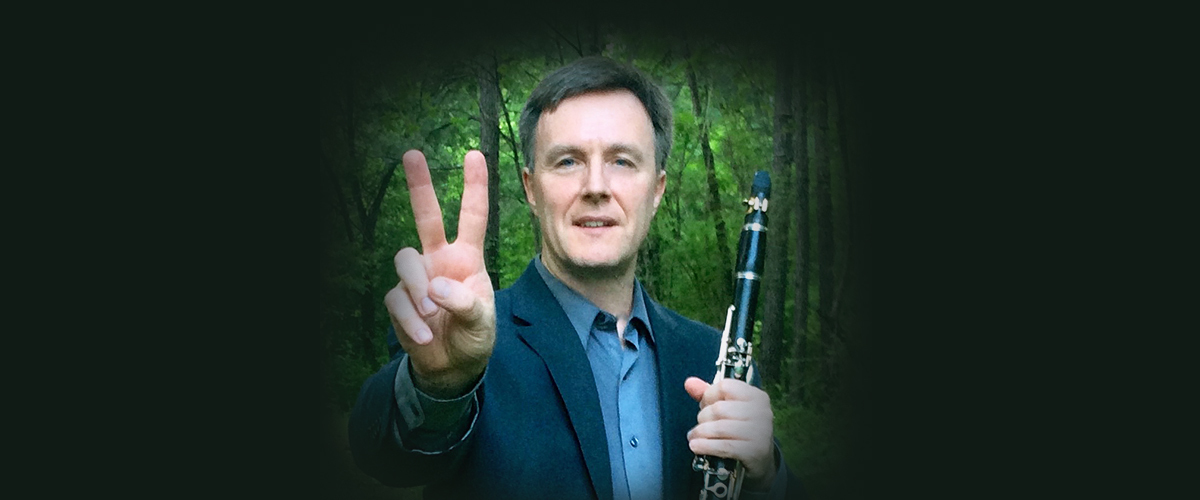D. Ray McClellan | Vandoren Artist Profile
Professor of Clarinet at Hugh Hodgson School of Music at University of Georgia
Date Posted: June 19, 2018

When did you decide you wanted to be a musician, and what drew you to that decision?
By the age of 12 I knew that I wanted to be a musician. My father was an amateur jazz singer and my mother played piano, so there was always music in the house. My high school teacher, Thomas O’Connell, assigned me my first concerto and a Music Minus One recording to go with it. Once I became aware that there were people who play and teach the clarinet as a job and made recordings, I very much wanted to do that.
Who have been some of the most influential people in your life?
My loving parents, my extraordinary wife Erica, my pianist friend Timothy Shafer. David Weber was the biggest influence on my clarinet playing. My other teachers were also very influential: Thomas O’Connell , Victor Sawa, Jonathan Lautman and Ethan Sloane. Harold Wright wasn’t a teacher of mine, but he influenced my playing through his recordings.
What was it like to study with David Weber?
It was fantastic! It was like stepping into another world every week. The tone of the lesson was set almost upon entering his West End Avenue apartment building. While riding the antique elevator, I could hear Mr. Weber’s famous signature sound as I approached the 7th floor. He had a simple and remarkable work ethic. He was like a master carpenter who owned his own business and never left it unattended. His approach was totally vocal – very much like a singer. He devoted a lot of time to foundational tone studies, scales, intervals, articulation. Everything that he did had a beautiful shape to it – even Klose’s Thirds. He also expected his tone and flexibility techniques in technical passages, so nothing ever seemed like a dry exercise. He assigned a lot of etudes and practiced them himself, even after he retired. With repertoire he was generous with his ideas and pencil marks. I still treasure my copies that have his interpretive markings. But the work ethic is worth mentioning twice. Mr. Weber pushed his students to work hard at every aspect of playing. I am incredibly grateful for it and I know that his other students feel the same way.
What are the greatest challenges you have faced as a musician and how have you overcome them?
Playing the clarinet is a big challenge! But the greatest challenge that I faced was self-doubt. I think that many musicians have similar struggles. Eventually, what helped me was talking about it. After some pivotal discussions with a trusted friend and mentor, I set new goals. Great things came from that process, so I now make a point of talking with my students about their career objectives. One thing that I like to point out is that people who have jobs often want to help developing young musicians. I guess that there is something energizing about mentoring, so don’t be afraid to ask for advice. People love to tell other people what they should be doing, and they will usually do it at no charge. Have you noticed?
What does your practice routine look like?
I start with David Weber’s 5 Note Chromatic Long Tones. Currently, I’m playing Taffanel-Gaubert Scales, Eugene Gay Scales, 5 note chromatic scales, Lebance Arpeggios, my own articulation studies, Langenus Tonguing Study, my silent finger drills and then whatever repertoire that I happen to be performing.
What is your current Vandoren setup?
B4013 Mouthpiece, Gold M|O Ligature, V12 3.5+ reed.
What is your relationship with reeds? Do you have a reed break-in process?
I spend a lot of time with them. The break-in process involves 5 days of polishing the front and back with ordinary copy machine paper, soaking in water for a few minutes and playing each for a few minutes while adding more playing time each day. The V12 3.5+s that I use are just a little hard for me with my B4013 mouthpiece. This enables me to sand the reeds down a little by taking something off of the tip, the back and the entire face of the reed. I test the reed often during this process and try not to take too much off at one time.
What is the Clarinet Academy of America?
CAA is a clarinet academy that Robert DiLutis and I started about eight years ago. It is held at the University of Georgia and University of Maryland on a rotating basis. The two of us are always there teaching, and we have at least one guest artist with us each year. One of our first goals was to run a camp to help clarinet players improve and at the same time keep the tuition low. There are lessons, student and faculty concerts, master classes and topical classes covering musicianship, reed work, how to practice, how to prepare for an audition, and a mock audition all in a relaxed atmosphere. www.clarinetacademyofamerica.com
Learn about Vandoren JUNO reeds - the only reed specifically designed for students
Subscribe to the We Are Vandoren E-newsletter (WAVE) to receive 4 weekly articles for Performers, Students, and Educators